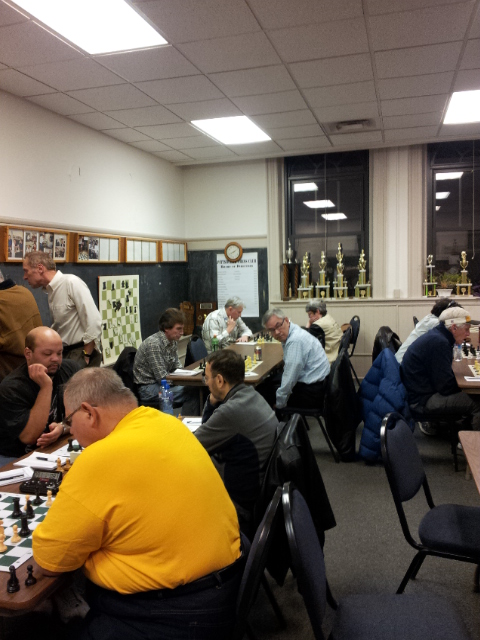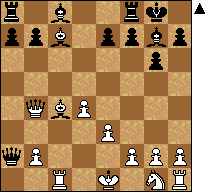Round 2 of Pittsburgh Chess Club Tournament: Very short game with a note on psychology

After the complex game in round 1, I was hoping for another interesting fight in round 2, in which I played White.
Unfortunately, the game ended up being very short, with my having a won position after ten minutes of play. My opponent kept going for a while, but resigned before an hour was up.
Today’s lesson
Since the game was so short, I will be writing about the psychology of what happened, what has happened in the past with this opponent (whom I have now played twelve times in my life in tournaments), and what might have happened.
The complete annotated game
I am not including the complete game because the winning position straight out of the opening says it all (see below).
Preparation
Our previous encounters
As I mentioned, this was the twelfth time I have faced this opponent since I started playing tournament chess in Pittsburgh seven years ago.
The last time I played him was in the Tuesday night tournament two months ago, in which I played him as Black in round 2. That marked the eleventh time I had played him, and the eleventh time I had won.
I came into tonight’s game against him having a record of six wins as Black and five wins as White, and no losses or draws.
Imagine what it’s like to have lost all eleven games you have played against a particular opponent over the past seven years.
The psychology of loss
It’s a very tough situation to be in. I have never had this kind of poor record against anyone, because I have not played enough tournament chess, encountering a much stronger player repeatedly, to have had this kind of experience.
However, the closest I have been to this situation has been against an Expert whom I have a really bad record against (sadly, he passed away relatively recently, so I will never get another rematch against him to prove that I have resolved my psychological issues), despite having a won position in almost all of our encounters. (I mentioned one of these crazy won positions here.)
It’s very difficult to face someone that you know you’ve lost to again and again. Even if you know you “could have” played better, you wonder why you didn’t. You question yourself. You get angry. You get anxious.
My preparation
I did a bit of preparation myself, because in many of our games, I actually fell into a lost position and won only because he made more errors later. I mentioned after September’s game how I got spooked and ended up in an even position and worried that the result might be a draw. However, I was determined to just play the position out and my opponent fell apart and I won.
Looking at my record of (now) twelve wins out of twelve games makes it look like my games against him were a piece of cake. Nothing could be further from the truth: he played quite well in some of our games, and simply made unforced errors at critical points.
My goal since I returned to chess this year has been to slay some of my own demons when playing against him: I want to win every game “correctly”, through my strong play and not through his unforced errors.
Tonight, as White, I expected to play into the same opening variation that we had played twice five years ago, the last two games in which I was White and he was Black. In fact, after the second of these games, he had said he had prepared for the variation I had played in the first one, but I had deliberately varied. Tonight, I had planned to play into one of the variations deliberately, in case he wanted to prove himself again, because in those two games, I had actually misplayed the opening eventually and gotten into trouble. So for tonight, I was choosing to do it right this time, rather than avoid that problematic opening variation.
His preparation
So what was his preparation? A friend of mine told me that he had asked last Wednesday whom he was going to play this Tuesday (since the pairings for the next round are made right after all the games are done on Tuesdays), and what color he was going to get. So he had known for almost a week that he was going to be Black against me.
After tonight’s game, I did not ask him what his preparation was, but I can only guess by how the game proceeded.
Overview of my game
The opening
I decided to play d4 deliberately aiming for the opening variation we had fought over the last two times I was White against him.
To my surprise, he varied quickly by playing the Grünfeld Defense against me. So it would seem that he scored psychologically.
But who surprised whom?
Maybe I missed something, but I have never seen him play the Grünfeld Defense. It definitely is not what he usually plays, in any case; in tournaments I saunter around sometimes to check out other people’s games, and so I have a decent idea of what openings everyone plays.
Given that I suspected he did not play this opening often, I simply chose to play a less common variation in response (after too many “surprises” in the past, I now always have several less common variations up my sleeve in every opening I play).
He clearly did not know how to continue properly, and simply fell apart, making poor moves until he lost a piece, after which he should have resigned, but did not:

Lessons
- It is admittedly hard to play against someone that you’ve lost eleven games to and never won or drew against.
- However, this does not mean the winner does not also have his own anxieties about keeping the streak alive and honest.
- When trying to surprise an opponent, make sure you don’t surprise yourself instead!
- My opponent should have studied up details of his favorite opening that I was going to play into, instead of avoiding his favorite opening. You must have faith in your openings, and not abandon them because you lost; the loss was not necessarily the opening’s fault (and in our case, definitely was not).
What next?
Next week for round 3 I expect to be Black, against probably a fellow Expert.
Conclusion
I had a disappointingly short and one-sided game in round 2 of the tournament, in which my opponent seemed unprepared for the very opening surprise he tried to spring on me. I hope that the next time we meet again in a tournament, we will have a better game.
